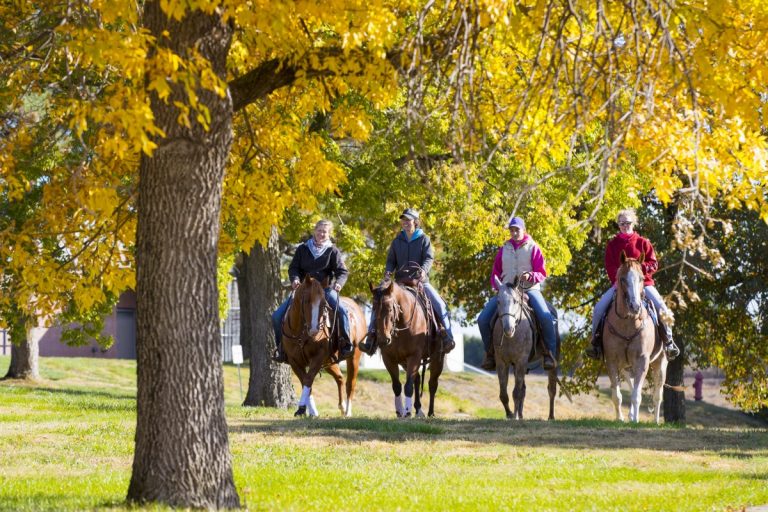
“This is a great time for our students to be entering the field of agriculture.” – Ron Rosati, Dean of the Nebraska College of Technical Agriculture
Capitalizing on its unique position in the heart of the prairies and plains of the Great American Midwest, the Nebraska College of Technical Agriculture (NCTA) offers a practical, applied and experiential learning journey for those hoping to enter the agricultural field.
According to figures from the US Department of Agriculture, agriculture, food and related industries contributed a significant US$992 billion to the US Gross Domestic Product (GDP) in 2016. Of this, crop production contributed US$185.7 billion, with 43 percent of this coming from cash receipts from corn and soybeans alone, while income from animals and animal products amounted to US$189.8 billion, with cattle receipts accounting for 41 percent of that total; poultry and eggs amounting to 25 percent; and total profits made from dairy contributing 19 percent overall.
All things considered, agriculture means big business in the States, opening a torrent of opportunities for prospective students hoping to learn the latest technology in modern, commercial production agriculture.
As an institution that blends exceptional academics with outstanding teaching, and stands at the forefront of industry’s most current innovations, no school teaches applied agricultural technology better than NCTA.

Image courtesy of the Nebraska College of Technical Agriculture
Trailblazing the development of crop and irrigation technology, as well as the fields of animal management, food-related sciences, and veterinary technology; NCTA excels at giving students the tools necessary to be successful in commodity-based agricultural industries.
Value for Money
While the benefits of studying abroad are widely publicized, it’s hardly a decision that can be made off-the-bat, with the rising financial burden of tuition often putting students off.
HSBC’s 2016 report titled, The Value of Education: Foundations for the Future, says US is considered the top choice among parents looking to send their child away for overseas study, but with an average annual cost of US$33,215 for tuition, it’s also the most expensive.
This is where NCTA stands out, offering one tuition fee for all from the fall 2017 semester.
As a leader in technology-based agricultural study, the college prepares students to become visionaries and entrepreneurs of this thriving, global industry. With access to cutting-edge technologies and first-rate farming facilities, NCTA students receive a first-rate education for a fraction of the price, with the new tuition rate seeing both resident and non-resident students pay just US$129 per semester credit hour.
The school also hosts an open admissions policy and a commitment to student success – with 91 percent of students receiving financial aid in the past three years, highlighting NCTA’s dedication to easing the financial plight of every global applicant.

Image courtesy of the Nebraska College of Technical Agriculture
And if that’s not convincing enough, the Return on Investment (RoI) from the NCTA education is one you’d be hard-pushed to find anywhere else in the world. NCTA is ranked among the top colleges in the United States for return on educational investment. According to its college graduate survey, five years after graduation, 76 percent of graduates still believe NCTA’s career preparation to be Good or Very Good; 62 percent found employment in a relevant and rewarding agricultural field; and 71 percent claimed to have held their full-time professional position for the full five years since graduation.
Leading Academics
Through a comprehensive portfolio of Academic, Speciality, and Online programs, NCTA is honing and refining the agricultural innovators who will shape tomorrow’s world. The college is nationally ranked for the quality of its academic programs.
Here is a sample of the college’s unique Academic offerings:
NCTA’s Agribusiness Management major nurtures students into competent and responsible citizens, promoting involvement, ingenuity, and individuality within the agribusiness. From this comprehensive program, graduates go on to forge successful careers in agriculture finance and at farm co-operatives; as office managers in agricultural corporations; or as owners of organizations in agricultural production.
When studying Animal Sciences, students work extensively with livestock to develop the skills and knowledge necessary to manage healthy and profitable herds. Students in agricultural education develop the skills needed to teach others about modern agricultural practices.

Image courtesy of the Nebraska College of Technical Agriculture
“The simple thought of going to college scared me,” says Katharine Schudel, student of Animal Science at the School. “However, when I came for a tour of NCTA, I fell in love with the atmosphere of the campus. I felt at home and comfortable,” she adds. “The fact that the cost of tuition and housing…is much less than at other colleges was another deciding factor for me to study here. The Professors are always willing to help me out when I am struggling with a class. Plus, all my classes will easily transfer to UNL.”
Students of Agriculture Education learn to promote the value of agriculture both in and outside of the classroom setting, instilling a passion for learning and the land in future generations. It’s a versatile degree offering transferrable skills that will see you through any career, providing a hands-on education that serves as the ideal start to working life.
Agronomy at NCTA is an industry-informed program that teaches students how to utilize the latest technology to profitably and sustainably produce commercial crops. Here, you’ll gain practical knowledge and experience with crop genetics, weed control technology, fertilization regimes, precision agriculture, irrigation management, and more.
Agricultural Equipment Management is a two-year course that allows students to master all things surrounding technologically-rich agricultural equipment, covering everything from troubleshooting, to maintenance, to operating, and beyond.

Image courtesy of the Nebraska College of Technical Agriculture
The Veterinary Technology program at NCTA is one of the oldest accredited programs in the United States. Veterinary technology students develop extensive skills in managing animal health. Students gain technical proficiency in more than 140 animal health skills through activities in the college surgery, veterinary clinic, diagnostic laboratories, and associated facilities. Students work with agricultural livestock, companion animals, and exotic animals found in zoos.
The ideal preparation needed to forge a long and successful legacy in agriculture…
“We focus on tangible learning and hands-on education relevant to modern agricultural careers,” Dean Rosati concludes. “At the end of a day of classes, students can look back on the past few hours and clearly see that they have developed specific skills that are immediately useful in various agricultural endeavors.
“We prepare students to be leaders and entrepreneurs in agricultural industries and we do so in a warm and friendly environment.”
Follow NCTA on Facebook, Twitter and YouTube
Liked this? Then you’ll love these…
5 US Agricultural Colleges producing graduates that safeguard our future
The phenomenal demand for Environment, Agriculture and Natural Resources graduates in the USA







